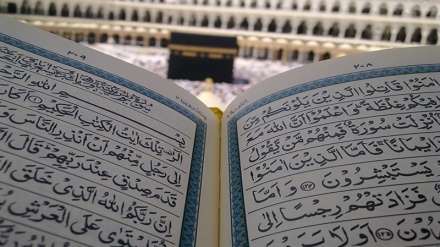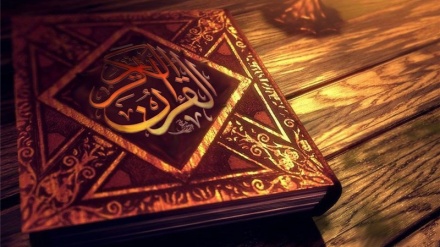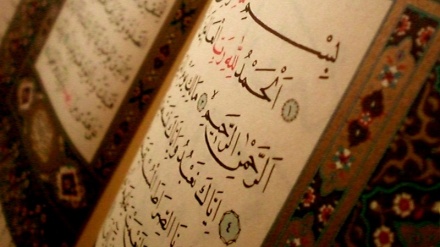Path towards Enlightenment (1017)
Salaam, and welcome to our latest episode of “Path towards Enlightenment”, which is an endeavour to make you and us familiar with an easy and fluent explanation of God’s Final Scripture to all mankind, the holy Qur’an that was revealed to the Last and Greatest of all Messengers, Prophet Muhammad (blessings of God upon him and his progeny).
As you know, last week we started explanation of “Surah Tahreem”, number 66 in the serial order of compilation of the holy Qur’an, which mentions the intrigues of two of the several wives the middle-aged Prophet had to marry in the last ten years of his life in order to break the taboos of the age of ignorance, following the passing away of his loyal wife, Hazrat Khadija (peace upon her) with whom he had spent 25 long blissful years without taking any other spouse. It happened that these two women who were accomplices of each other and whose names have been mentioned in books of hadith and history, including those of our Sunni brethren and need not be repeated here, caused offence to the Prophet. God therefore warned them of dire consequences of their misdeeds unless they repent, and consequently urges all believers to be obedient to Divine Commandments in order to guard themselves and their families against Hellfire. The Surah cites examples of two of the virtuous women, that is, Asiya the wife of the tyrannical Pharaoh of Egypt, and the Virgin Mary – the mother of Jesus (peace upon them). It also gives examples of two of the wicked women, by referring to the disbelieving and disobedient wives of the Prophets Noah and Lot.
If you might recall, in our explanation of the first five Ayahs of this Surah we said confidence is one of the characteristics of a loyal wife while disclosure of what has been confided is considered conspiracy against the husband. So magnanimous was the behaviour of the Prophet that he was kind to even these conspirators amongst his wives, who used to disturb him, since at times it is necessary to overlook the mistakes of family members to give them time to repent and make amends. The Prophet is always protected by God Almighty Who has assigned angels to be his supporters along with the Saleh al-Momineen or the Most Virtuous of the True Believer, which is a reference to Imam Ali ibn Abi Taleb (AS).
Here we invite you to listen to Ayah 6 and 7, which read:
“O you who believe, save yourselves and your families from a Fire whose fuel is people and stones, over which are (assigned) angels, severe and mighty, who do not disobey whatever Allah has commanded them and carry out what they are commanded.”
“(They call out) O faithless ones! Do not make any excuse today. You are only being requited for what you used to do.
It is the duty of the believers to strive to preserve themselves and their families from committing sins, and this is possible by setting personal examples of faith, spirituality, and abstinence from what God has forbidden. Both husband and wife, as guardians of the family, are responsible for proper grooming and education of the children as well as for whoever they are guardians, by enjoining the good and forbidding the evil, in order to prepare a healthy and God-conscious environment. Hellfire is not like the fire in this world, since its flames rise up from the inward of the sinners cast into them as well as from stones that are combustible. Hell is not a place where one may expect compassion and is the crucible of Divine Wrath for the consequences of one’s own disbelief and unrepentant acts, and that too after having been shown much mercy during the life of the mortal world. Thus, strict and severe angels are assigned to tend the Fire, without the least deviation from Divine orders, which means crying and beseeching have no effect.
As is clear by Ayah 7 disbelief is not pardonable on the Day of Resurrection and no excuse will be accepted, which means the disbelievers’ realization of their follies and repentance shall be of no avail on that Day. In other words, the atheists, the polytheists, the unrepentant sinners, and all other deviants who neither believed in God nor the teachings of the Prophets, shall be punished for their behaviours
This Ayah teaches us that:
- We should always be watchful of our words and deeds.
- Belief in the Day of Resurrection and the fire of Hell is effective in one’s actions and behaviour.
- Personal examples of reform, good deeds, and abstinence from sins, have positive effects on the children, the family members and the society.
- Angles never disobey what God has commanded them.
- Those who neither believed in God nor the teachings of the Prophets, including those who distorted the Divine message, will suffer the consequences of their deeds by being cast into Hell.
In conclusion of this week’s episode of Path towards Enlightenment, here is Ayah 8 of Surah Tahreem:
“O you who believe, repent to Allah with sincere repentance! Maybe your Lord will absolve you of your misdeeds and admit you into gardens with streams running in them, on the day when Allah will not let the Prophet down and the faithful who are with him. Their light will move swiftly before them and on their right. They will say, ‘Our Lord! Perfect our light for us and forgive us! Indeed You have power over all things.”
The believers are addressed here and asked to repent sincerely to Allah to be forgiven, since whoever is cleansed of sins will be admitted into Paradise. Sincere repentance emanates from the heart and is not the utterance of mere words without feeling any inner remorse or rectifying of the wrongs done. The Ayah says the true believers are blessed on the Day of Resurrection with the company of the Prophet. A special light, indicative of their virtue in the world, will enlighten their path on the Day of Resurrection, and they will sincerely beseech the All-Merciful Lord to perfect their light and forgive whatever least faults they may have committed.
From this Ayah we learn that:
- The believers should seek forgiveness from the Lord Most High of whatever faults they have committed, since repentance and reform are among the signs of faith.
- Unless absolved and cleansed of sins, no one will enter Paradise.
- Repentance and seeking of forgiveness cleanse the black spots that the hearts have incurred because of the dark past and once these are cleansed, light and luminosity become manifest for the true believers.
- Righteous deeds of the true believers appear in the form of light on the Day of Resurrection.
RM/AS/SS


